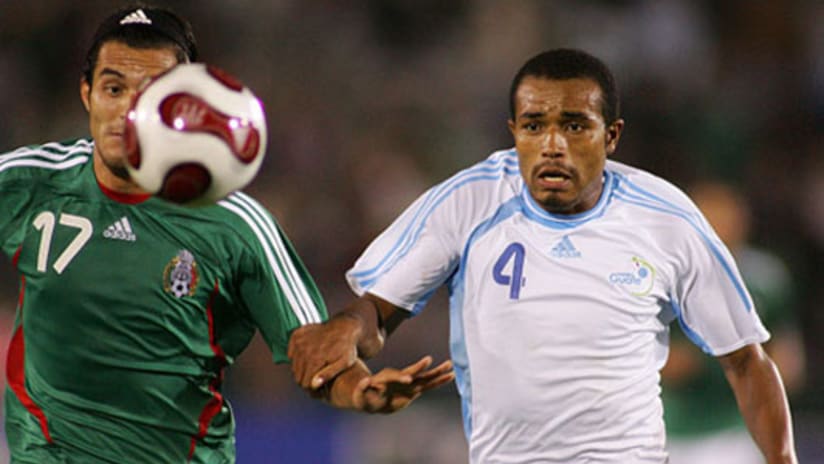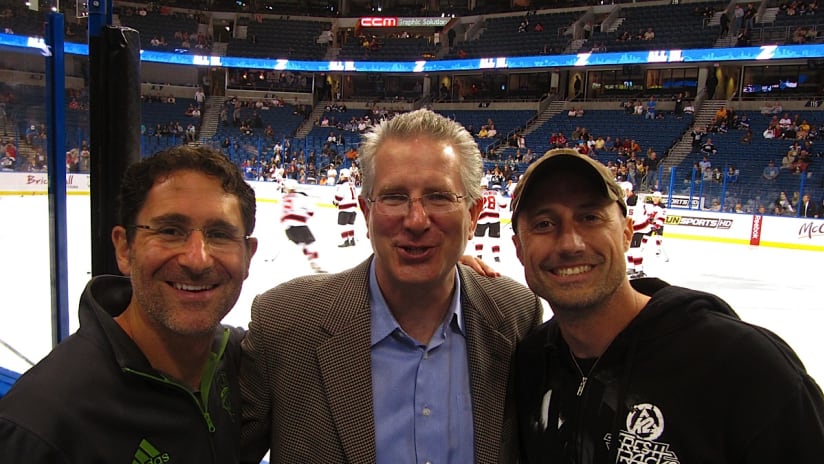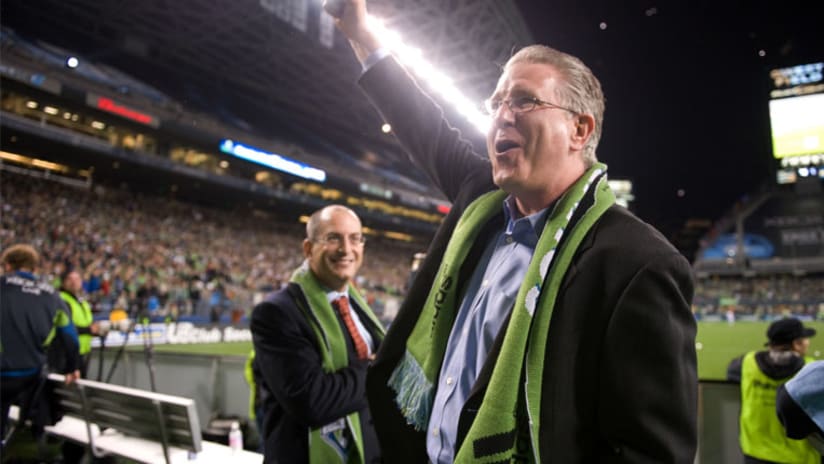While Seahawks fans rule the roost when it comes to creating noise on a given NFL gameday, Seattle’s soccer fans will soon have their say.
Getting Ready to Rumble
In the gridiron game, they create arguably the best atmosphere in professional sports.
But before long the 12th Man will have company at Qwest Field.
While Seahawks fans rule the roost when it comes to creating noise on a given NFL gameday, Seattle’s soccer fans will soon have their say.
All of the elements are in place for some more rolling thunder at Qwest beginning in 2009. Major League Soccer’s newest team and its growing legion of fans are already sending shockwaves through the sport with over 10,000 season ticket deposits during the first 30 days.
Now imagine how the numbers and anticipation will multiply over 15 months. And get ready to rumble.
“It’s going to be great,” says Fred Mendoza, vice chair of the Qwest Field’s Public Stadium Authority. “The lower bowl really is a good, small-size stadium. With 8-10,00 on one side, it rocks. I have no doubt that with 20-25,000 it’s going to be an awesome place to watch a game.”
Tod Leiweke, Seahawks CEO and Paul Allen’s representative to the MLS ownership group, is confident that the football team’s home field advantage will be replicated in soccer.
“We have loudest stadium in the NFL, and in 2009 it’s going to be the loudest stadium in MLS,” says Leiweke.
Built for the Game
Although everyone acknowledges the many amenities of Qwest, it’s the fan’s gameday experience which will be the measure of its status as a top-class soccer venue.
Before ground was broken on construction, Mendoza said stadium architects Ellerbe Beckett conferred with Jimmy Anderson, facility consultant to World Cup ’94. Be it sightlines, lighting or the field’s crown, Qwest was built with soccer in mind. And two veteran soccer correspondents confirm it.
“I was at Qwest when D.C. (United) played Real Madrid a couple years ago,” says MLS beat writer Steven Goff of the Washington Post. “It’s an awesome stadium and a great place for soccer. It’s downtown and it has a lot of things going for it.”
Ridge Mahoney, longtime senior editor at Soccer America, visited Seattle for the 2003 friendly between Manchester United and Celtic. “It looked like a soccer stadium,” recalls Mahoney.
“It sounds kind of simple, but the first things I look for are the right field dimensions,” he said. “That, plus a clean look and getting as many fans as close to the action as possible.”
Capacity for MLS games will be 24,500 at Qwest, with all seating on the lower level, where front rows are within a high-five of the players.
If fans feel they’re a part of the game, says Goff, they tend to be more engaged, more vocal. The more sound, the more motivated the players become.
And Qwest Field’s roof will play a dual role. “A roof keeps people from getting wet, of course,” said Mahoney, “but it also increases the noise volume considerably. It’s another good element of a soccer stadium.”
The Gameday Experience
Mendoza may be biased, but believes Qwest is the equal of any European soccer stadium, including Manchester’s Old Trafford. “Our stadium is better than any of them,” said Mendoza, who has attended games in Germany and England. “There’s no better place to watch the game. We’ve added American-style creature comforts and amenities to a world-class soccer stadium.”
Qwest will be one of three large MLS venues in 2009, joining New England’s Gillette Stadium and 45-year-old RFK in Washington, D.C. Despite its age and flaws, the latter was long regarded as the league’s ultimate gameday theater.
“I think the atmosphere is more about the fans than the actual structure,” says Goff. “RFK holds 46,000 and D.C. United averages about 20, so the place is half-full. But the difference is the fans; they are so passionate and emotional.’
Latin American supporters have sung in fine voice since D.C.’s inaugural season of 1996. The Screaming Eagles, generally more Anglo in composition, began by mimicking what they witnessed in Europe, but now have developed an identity all their own.
“Even at this year’s MLS Cup, when D.C. United wasn’t playing, the United fans came out, and they were standing and cheering and jumping up and down.” Said Goff: “It was a heckuva scene.”
Toronto Sets the Standard
Goff and Mahoney both tout Toronto as home of the ideal situation: an urban stadium in a cosmopolitan city with the most maniacal supporters in MLS.
“In Toronto, the stadium is 360 degrees of noise and passion. Even RFK can’t match that,” says Goff. “All the way around the stadium, it’s pretty fanatical. Win or lose, they were behind the team.”
Toronto FC sold an MLS record 14,000 season tickets for its first season and attracted capacity crowds of 20,000 to each game at BMO Field. Already, Seattle has sold 10,000 season ticket deposits, indicating that Qwest could be packed as well when play begins.
“They’re definitely on the right track,” said Goff. “There are other similarities to Toronto, in that (Qwest) is downtown, accessible to transit, near the water and there’s a nice view of the skyline.”
Whether the stadium is urban or suburban, large or small, modern or old, Goff still maintains that it’s the human inhabitants who carry the day.
“The fans play the biggest part,” he says. “It doesn’t matter if you’re playing in a big stadium or soccer specific, enthusiastic supporters make all the difference.”




